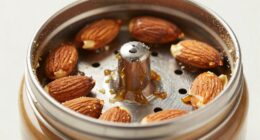Eating butter by itself isn't necessarily bad, but it does come with some caveats. While butter provides beneficial vitamins and healthy fats, its high saturated fat content can raise your LDL cholesterol, increasing heart disease risk. If you consume too much, you might also gain weight and miss out on vital nutrients found in other foods. However, when eaten in moderation—around 1-2 tablespoons daily—butter can fit nicely into a balanced diet. If you're curious about how to enjoy butter responsibly and its place in modern eating trends, there's more to explore!
Key Takeaways
- Eating butter by itself can lead to excessive calorie intake, potentially causing weight gain over time if not balanced with other foods.
- Its high saturated fat content may elevate LDL cholesterol levels, increasing heart disease risks when consumed in large amounts.
- While butter provides essential vitamins, relying solely on it can result in nutrient deficiencies from lack of diverse food sources.
- Moderation is key; 1-2 tablespoons daily can be beneficial, but excessive consumption may lead to health issues.
- Different types of butter, like grass-fed or ghee, can offer varying health benefits and should be considered when making choices.
Nutritional Overview of Butter

When you look at butter, it's important to understand its nutritional profile. A tablespoon of butter, weighing 14 grams, contains about 102 calories and 12 grams of total fat, with 7 grams being saturated fat. It also has 3 grams of monounsaturated fat and 0.5 grams of polyunsaturated fat. Additionally, butter is composed of about 80% milk fat, making it a rich source of calories and fats. Butter's creamy texture is influenced by the emulsification process during churning. Butter is typically produced using continuous butter making methods, which ensure consistency in texture and flavor. Many culinary experts prefer using European butter for its superior quality and flavor in recipes.
While butter is high in fats, it's essential to note that it provides beneficial compounds too. You'll get 11% of your Daily Value of Vitamin A from just one tablespoon, along with smaller amounts of Vitamin E, Vitamin K, calcium, and potassium. Butter also contains conjugated linoleic acid (CLA), known for its potential anti-cancer properties and improved insulin sensitivity. Another beneficial compound, butyrate, supports digestive health and reduces inflammation, contributing to overall well-being.
In terms of macronutrients, butter has no carbohydrates or fiber, and it contains a small amount of protein (0.12 grams). It also has cholesterol at 31 milligrams per tablespoon, which is an aspect to consider in your overall diet.
Understanding these nutritional aspects can help you make informed choices about incorporating butter into your meals.
Health Risks of Eating Butter Alone

Eating butter by itself may seem appealing due to its rich flavor and creamy texture, but it comes with several health risks that you should be aware of.
First, butter is high in saturated fat, which can elevate your LDL (bad) cholesterol levels. This increase contributes to atherosclerosis and can heighten your risk of heart disease, strokes, and heart attacks. Additionally, about 63% of butter's fat content is saturated fat, which further emphasizes the need for moderation in its consumption. Regular consumption of saturated fats can lead to increased heart disease risk, emphasizing the importance of balancing your diet. Moreover, diets high in saturated fats can potentially lead to chronic disease prevention challenges. In particular, ice cream consumption has been linked to increased heart disease risk when consumed regularly. Furthermore, incorporating herbal alternatives into your diet can provide healthier fat options that support heart health.
Additionally, butter is calorie-dense, with about 100 calories per tablespoon. Overindulging can lead to weight gain, potentially adding up to 10 pounds each year without proper dietary adjustments. This weight gain can result in visceral fat accumulation, linked to numerous health issues.
Eating butter alone can also cause nutrient deficiencies, depriving you of essential vitamins and minerals typically found in plant-based foods. The saturated fats in butter may trigger inflammation, which is associated with conditions like arthritis and cardiovascular disease.
Lastly, excessive butter consumption is linked to an increased risk of Alzheimer's disease, colon cancer, and digestive issues due to lactose and casein.
Given these risks, it's wise to reconsider snacking on butter by itself.
Benefits of Moderate Butter Intake

Moderate butter intake can actually offer some surprising health benefits. For starters, butter is packed with essential vitamins like A, D, E, and K2, which play crucial roles in maintaining your overall health. Just one tablespoon contains about 102 calories and 12 grams of fat, making it a rich source of energy. Additionally, butter is a source of healthy fats, which can be part of a balanced diet when consumed in moderation. Moreover, butter can provide anti-inflammatory benefits that contribute to overall well-being.
You might be glad to know that butter contains beta-carotene, linked to a reduced risk of certain cancers, including lung and prostate cancer. Plus, the vitamin D and calcium in butter support bone health, helping prevent conditions like osteoporosis. In fact, calcium absorption is enhanced by the presence of healthy fats found in foods like butter. Butter production has evolved over the years, with modern techniques increasing its quality and safety.
If you're concerned about your skin, vitamin E found in butter can help reduce UV damage and inflammation. In addition, butter can be a great companion for low-carbohydrate diets, aiding in weight management and keeping you feeling full longer.
The butyric acid in butter may also help reduce inflammation in your digestive system. With its impressive nutrient profile, butter can be a delicious and beneficial addition to your diet—just remember to enjoy it in moderation!
How Butter Affects Your Diet

Butter can play a significant role in shaping your diet, influencing everything from your daily calorie intake to your nutrient absorption. Each tablespoon packs around 102 calories and 12 grams of total fat, including 7 grams of saturated fat. While this high fat content can contribute to weight gain if consumed excessively, moderate intake of 1-2 tablespoons daily can help you maintain a balanced diet without overshooting your calorie goals. Moreover, lowering saturated fat intake is associated with decreased cholesterol levels and improved heart health. Interestingly, using a butter infuser can enhance the flavor of butter, allowing for creative culinary applications that complement a healthy diet. Additionally, incorporating high-fat content options like butter into meals can enhance the absorption of fat-soluble vitamins. Furthermore, essential oils can be used in culinary applications to naturally enhance flavors while promoting overall wellness.
Butter is a source of essential vitamins like A, D, and E, along with calcium, which supports bone health. Additionally, butter contains fat-soluble vitamins, which are crucial for various bodily functions. However, it's important to be mindful of its cholesterol content, as it can raise LDL cholesterol levels. Although some studies show no direct link between butter consumption and heart disease, limiting saturated fat to less than 10% of your daily calories is still recommended.
Interestingly, butter also contains conjugated linoleic acid (CLA), which may assist in weight management. Additionally, beta-carotene found in butter can lower cancer risks and support eye health.
Butter in Popular Diet Trends

As dietary trends evolve, butter has found its way into various popular eating plans, capturing the attention of health enthusiasts and social media influencers alike. One noteworthy trend is the carnivore diet, where followers consume only animal-based products, including butter. Some dieters snack on sticks of butter, believing it aids weight loss and boosts mood. However, high saturated fat content raises concerns about increased LDL cholesterol and potential heart disease risks. Regular butter consumption can lead to increased heart disease risks due to its high saturated fat content. Additionally, managing cholesterol levels is crucial for those at risk of heart disease. Research indicates that a diet rich in antioxidants may help combat some of the negative effects of saturated fats. Furthermore, excessive intake of butter can contribute to long-term dental issues due to its high-calorie nature and potential for promoting unhealthy snack choices.
Social media, particularly TikTok, has amplified this trend. Users share videos of their daily butter consumption, often as a weight loss tactic. Yet, dietitians warn against this practice, advocating for healthier snack alternatives like nuts, seeds, and fruits. The spread of such questionable health advice poses public health risks, as unhealthy eating habits may proliferate. Additionally, the Law of Attraction principles suggest that positive beliefs about food choices can influence overall well-being and health outcomes.
Despite these trends, butter's presence in restaurants remains strong, with nearly half featuring it on their menus. This enduring popularity indicates that while butter may be a staple for flavor and richness, it's essential to consider the broader implications of its consumption within modern diets. Balancing your intake with nutrient-rich foods is key to maintaining overall health.
Making Informed Choices With Butter

When considering how to incorporate butter into your diet, it's essential to weigh both its nutritional benefits and potential health risks. Butter packs a punch with 102 calories and 12 grams of total fat per tablespoon, including 7 grams of saturated fat. While it provides vitamins A, D, and E, which support skin and eye health, its high saturated fat content raises concerns about heart disease. Additionally, butter's composition of 80% milk fat makes it a rich source of energy, and essential oils can be beneficial in enhancing your mood and overall well-being. Investing in diverse investment options can help diversify your portfolio, much like balancing your diet with healthy fats. It's also worthwhile to note that tax implications can impact your financial planning, just as dietary choices can affect your health. Moreover, excessive intake of saturated fat can lead to increased cholesterol levels, further heightening cardiovascular risks.
The American Heart Association suggests limiting saturated fat intake, so moderation is key.
You might also explore different types of butter. Unsalted butter contains no added salt, making it a healthier option, while grass-fed butter offers a better fat profile with more unsaturated fats.
Clarified butter (ghee) is ideal for high-temperature cooking, preserving its nutrients.
Think about how your body reacts to butter, as individual responses vary. Some may experience elevated blood fat levels, while others might benefit from its cancer-fighting beta-carotene.
Be mindful of portion sizes and consider balancing your butter intake with other healthy fats to make informed choices that align with your dietary goals.
Frequently Asked Questions
Can I Gain Weight From Eating Butter Alone?
Yes, you can gain weight from eating butter alone.
Butter is calorie-dense, with 102 calories per tablespoon, and if you consume too much without balancing your diet, those calories add up quickly.
Just one extra tablespoon daily can lead to about 10 pounds of weight gain over a year.
To avoid this, it's important to enjoy butter in moderation and ensure your overall diet remains balanced.
Does Eating Butter on an Empty Stomach Cause Digestive Issues?
Eating butter on an empty stomach can lead to digestive discomfort for some people.
If your body isn't used to fatty foods, you might experience bloating or indigestion.
However, butter contains butyrate, which can aid digestion and reduce inflammation.
If you're cautious and start with small amounts, you may find it beneficial.
Just remember, individual responses vary, so listen to your body as you incorporate butter into your diet.
Is It Safe for Children to Eat Butter by Itself?
It's generally safe for children to eat butter, but you should be cautious.
Serving it in thin spreads or mixing it into smooth foods reduces choking risks. Avoid giving them firm, cold chunks. Melted or whipped butter can also be fun for dipping.
How Does Butter Consumption Affect Skin Health?
Consuming butter can positively impact your skin health. Its essential fatty acids and vitamins A, D, and E help keep your skin moisturized and create a protective barrier.
You'll also benefit from its anti-inflammatory properties, which soothe irritation and redness. The antioxidants in butter combat free radical damage, reducing signs of aging like wrinkles and dark spots.
Can Butter Consumption Lead to Food Cravings Later?
Yes, butter consumption can definitely lead to food cravings later.
When you eat butter, the fat signals your brain to desire more fatty foods. This happens because the fat triggers nerve signals that influence your appetite, making you crave high-fat items even if you've eaten enough.
If you find yourself reaching for more snacks after butter, it's likely due to those cravings driven by your body's response to the fat.
Conclusion
In conclusion, while eating butter by itself isn't necessarily harmful, it's crucial to consider moderation and your overall diet. Butter can add flavor and healthy fats when used wisely, but relying on it too heavily may lead to health risks. Embrace a balanced approach by incorporating butter into a diverse diet. By making informed choices, you can enjoy the richness of butter without compromising your health. So go ahead, savor it, but keep moderation in mind!









